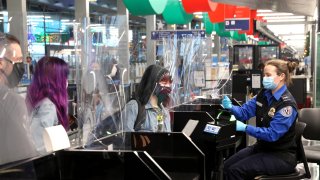
U.S. Customs and Border Protection officers seized hundreds of counterfeit driver's licenses inside packages moving through Chicago's O'Hare International Airport.
For about two weeks, from April 1-15, CBP said officers found 743 counterfeit documents produced outside the U.S. that were "potentially going to be used to fake an identity of young adults that have not yet reached the age of 21."
CBP defines counterfeit documents as fake documents that have the appearance of legal documentation, but are not issued by a legitimate organization or government agency. They are also not recognized in the U.S. as official travel or IDs.
“Counterfeit driver’s licenses are used by young adults who have not yet reached the legal drinking age,” said Shane Campbell, Area Port Director-Chicago. “Not to mention the criminal consequences, CBP's interception of these IDs significantly reduces the chances for alcohol to be purchased by underage individuals and hopefully reduces the consequences of their actions, including deadly accidents.”
Feeling out of the loop? We'll catch you up on the Chicago news you need to know. Sign up for the weekly Chicago Catch-Up newsletter here.
From April 1 to April 15, Chicago CBP officers seized 122 shipments containing 743 counterfeit United States driver’s licenses from all over the U.S. to include: Ohio, Florida, New Jersey, Pennsylvania, California, Mississippi, Texas, Connecticut, Utah, Minnesota, South Dakota, Washington, and Illinois.
All the driver’s licenses were hidden within handbags, jewelry boxes, and various toys.
Most of the licenses originated in China enroute to residences throughout the U.S. Only two companies have authorization by the U.S. Department of State to print international driver’s licenses in the United States: The American Automobile Association (AAA) or American Automobile Touring Alliance (AATA).
Local
The IDs are considered counterfeit based upon the lack of fine line detail, and exhibit features that are not consistent with the document type.
While CBP will often see these dark web transactions, according to LaFonda D. Sutton-Burke, Director, Field Operations-Chicago Field Office, the reasoning for buying fake IDs has evolved from teenagers trying to get into bars to more nefarious activity.
“Some of the major concerns as they relate to fraudulent identity documents include identity theft, worksite enforcement, critical infrastructure protection, fraud linked to immigration-related crimes such as human smuggling and human trafficking, and these documents can be used by those individuals associated with terrorism to minimize their scrutiny undergoing travel screening measures.”



